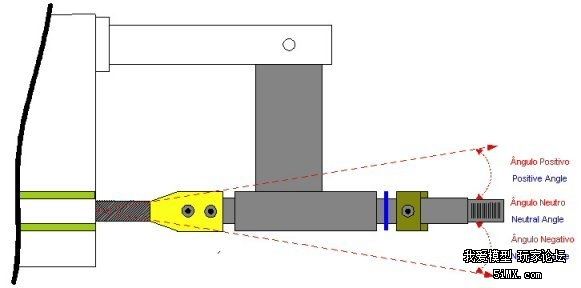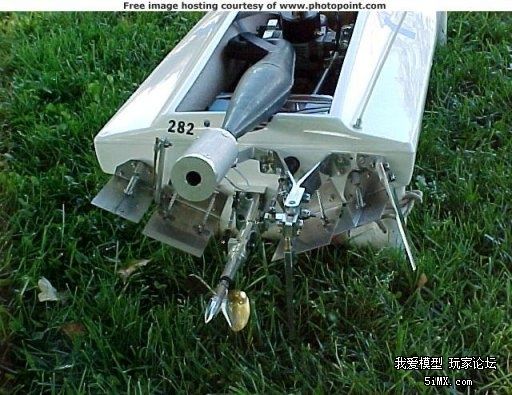|
|
本帖最后由 落叶de忧伤 于 2018-7-31 16:13 编辑
How to correct the attitude of the boat
如何调船
Center of Gravity: The chapter How to Assemble a R/C Boat, in the Technical session, shows how to calculate and adjust the CG. It's easy to understand that a CG towards the front tends to maintain the bow down into water, increasing the wet area and hampering the planning of the boat when at speed. On the other side, a CG too close to the transom tends to raise the bow too much, making the boat unstable at speed. As a rule of thumb, CG must be between 27% and 30% of the total length of the boat, measured from transom, for a completely assembled boat - ready to run except for the fuel. As very powerful engines tend to raise the boat's bow, under those circumstances a CG over the upper limit (30%) may be advisable. On the other hand, mild engines will be happy with the 27% rule.
重心:在装船的一章里面我们说明如何计算和调整重心。很容易理解,重心靠前,会压头,增加浸水面,阻碍船体起划。另一方面,重心靠后,会升水,降低船体的稳定性。经验来说,重心一定是在从船尾向船头方面的船体总长的27%-30%处(对于一条装好的船,油船不包括燃料,但电船包括电池)。强劲的动力会使船头抬起,这种情况下重心超过30%处也是可以的,反之亦然。
Strut angle: A strut has a positive angle when the prop shaft points upwards, far from the water surface. In this situation, the transom is pressed down. A negative angle occurs when the prop shaft points down, towards the water surface, raising the transom. If you imagine the boat supported on a transverse shaft that goes exactly through the CG, it's easy understand that, when the transom is lowered the bow goes up, reducing the wet area. The contrary occurs with a negative angle for the strut. Although apparently we could use the strut angle to correct any incorrect attitude, the truth is that the neutral angle is the ideal, just a few degrees off are allowed to adjust the wet area. If more than 2 degrees are necessary, something else should be wrong.
出轴角度:如果出轴向上,那么我们称之为正角度,这种情况下,下压船尾,如果你想象船体被一根穿过重心的硬棒横向支撑,那么这个很容易理解,船尾下沉,船头升水,减少浸水面。如果出轴向下,那么称之为负角度,提升船尾,压头,增加浸水面。虽然,理论上我们可以通过调整出轴角度来纠正船姿,然而中立角度却是最佳选择,最多调整范围在2度以内,如果超过了2度,就证明船体还有其他问题。

Trim tabs: Normally 2 are used on each side of the boat. The outer ones take care of the behavior of the boat on turns, the inner ones of the attitude when traveling in a straight line. We will take care of those from now. Increasing the trim tabs angles - orienting down the adjustable portion - raises the transom, dropping the bow - the boat increases the wet area. Inversely, reducing the trim tabs angle - directing up the adjustable component - lowers the transom and raises the bow, reducing the wet area.
压水板:通常船尾每侧有两个,靠外的负责船体转弯时的姿态,靠内的负责船体直行时的姿态。调整效果:增加压水板角度(向下调整压水板),将会提升船尾,压低船头,浸水面增加。相反调整,减少压水板角度(向上调整压水板),降低船尾,提升船头,减少浸水面。
Outer trim tabs act on turns. Remember, adjusting them to rise the transom makes the nose dig on turns, making the turns eventually sharper than desired.
靠外的负责船体转弯时的姿态。调整靠外的压水板来提升转弯时的船尾,从而压头,能让转弯半径变小。
Once again, the degree of possible actuation is limited - if correcting the attitude demands more than few degrees of actuation, we must look in another place the solution of the problem.
同样的,调整的角度是有限的。如果调整角度超过了范围,我们必须考虑是否存在其它问题。

|
|

 /1
/1 